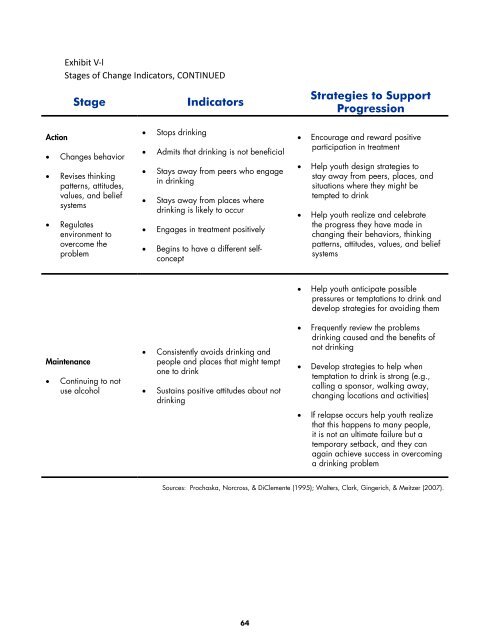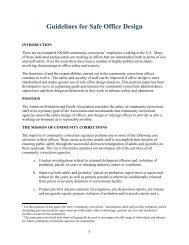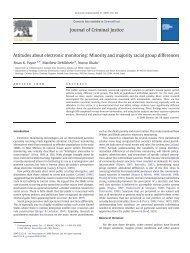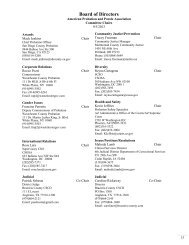Intervention Principles and Practice Guidelines for - Underage ...
Intervention Principles and Practice Guidelines for - Underage ...
Intervention Principles and Practice Guidelines for - Underage ...
Create successful ePaper yourself
Turn your PDF publications into a flip-book with our unique Google optimized e-Paper software.
Exhibit V-l<br />
Stages of Change Indicators, CONTINUED<br />
Action<br />
Stage<br />
• Changes behavior<br />
• Revises thinking<br />
patterns, attitudes,<br />
values, <strong>and</strong> belief<br />
systems<br />
• Regulates<br />
environment to<br />
overcome the<br />
problem<br />
• Stops drinking<br />
Indicators<br />
• Admits that drinking is not beneficial<br />
• Stays away from peers who engage<br />
in drinking<br />
• Stays away from places where<br />
drinking is likely to occur<br />
• Engages in treatment positively<br />
• Begins to have a different selfconcept<br />
Strategies to Support<br />
Progression<br />
• Encourage <strong>and</strong> reward positive<br />
participation in treatment<br />
• Help youth design strategies to<br />
stay away from peers, places, <strong>and</strong><br />
situations where they might be<br />
tempted to drink<br />
• Help youth realize <strong>and</strong> celebrate<br />
the progress they have made in<br />
changing their behaviors, thinking<br />
patterns, attitudes, values, <strong>and</strong> belief<br />
systems<br />
Maintenance<br />
• Continuing to not<br />
use alcohol<br />
• Consistently avoids drinking <strong>and</strong><br />
people <strong>and</strong> places that might tempt<br />
one to drink<br />
• Sustains positive attitudes about not<br />
drinking<br />
• Help youth anticipate possible<br />
pressures or temptations to drink <strong>and</strong><br />
develop strategies <strong>for</strong> avoiding them<br />
• Frequently review the problems<br />
drinking caused <strong>and</strong> the benefits of<br />
not drinking<br />
• Develop strategies to help when<br />
temptation to drink is strong (e.g.,<br />
calling a sponsor, walking away,<br />
changing locations <strong>and</strong> activities)<br />
• If relapse occurs help youth realize<br />
that this happens to many people,<br />
it is not an ultimate failure but a<br />
temporary setback, <strong>and</strong> they can<br />
again achieve success in overcoming<br />
a drinking problem<br />
Sources: Prochaska, Norcross, & DiClemente (1995); Walters, Clark, Gingerich, & Meitzer (2007).<br />
64

















